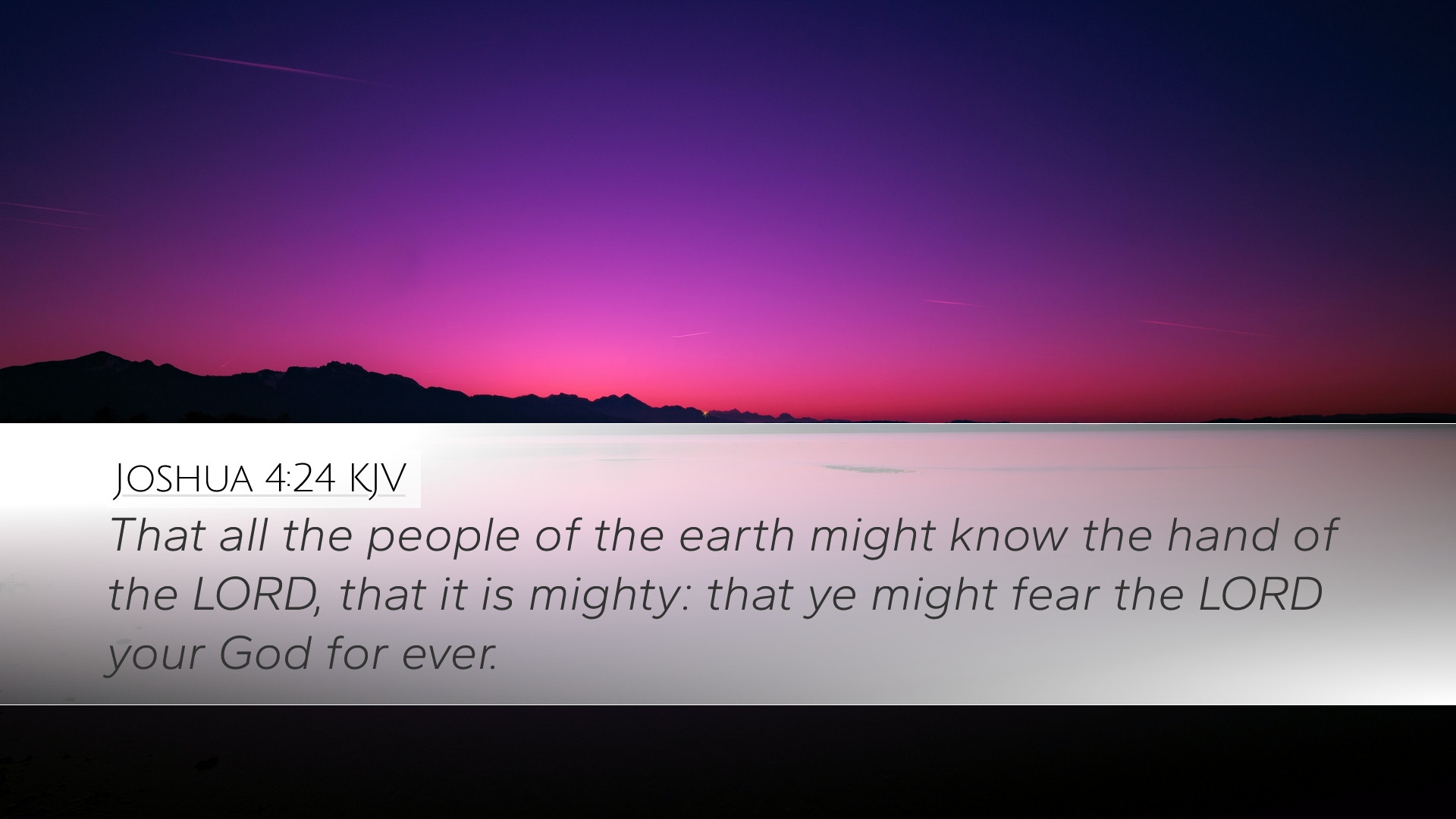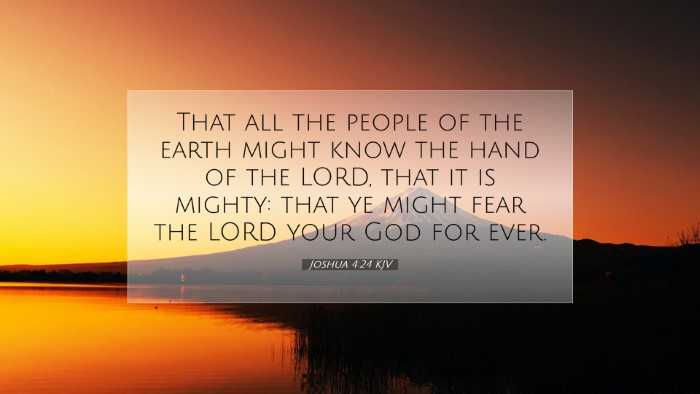Old Testament
Genesis Exodus Leviticus Numbers Deuteronomy Joshua Judges Ruth 1 Samuel 2 Samuel 1 Kings 2 Kings 1 Chronicles 2 Chronicles Ezra Nehemiah Esther Job Psalms Proverbs Ecclesiastes Song of Solomon Isaiah Jeremiah Lamentations Ezekiel Daniel Hosea Joel Amos Obadiah Jonah Micah Nahum Habakkuk Zephaniah Haggai Zechariah MalachiJoshua 4:24
Joshua 4:24 KJV
That all the people of the earth might know the hand of the LORD, that it is mighty: that ye might fear the LORD your God for ever.
Joshua 4:24 Bible Commentary
Bible Commentary on Joshua 4:24
Joshua 4:24 (KJV): "That all the people of the earth might know the hand of the LORD, that it is mighty: that ye might fear the LORD your God for ever."
Introduction
The verse Joshua 4:24 serves as a pivotal moment in the narrative of Israel's conquest of Canaan. Following the miraculous crossing of the Jordan River, this verse encapsulates the intended purpose of God's wonders, emphasizing His power and instilling reverence among His people and, indeed, all the nations. The importance of this verse stretches beyond historical recounting; it imparts a profound theological understanding pertinent to both contemporary and historical audiences.
Understanding the Context
-
Historical Background:
This event occurs after the Israelites have entered the Promised Land. The crossing of the Jordan River on dry ground demonstrated God's might in a way similar to the parting of the Red Sea.
-
Theological Significance:
In this moment, God sets a clear purpose for the miraculous act—so that all might know of His power and might, ensuring that future generations remember His deeds (Psalm 78:4).
Insights from Public Domain Commentaries
Matthew Henry
According to Matthew Henry, this verse emphasizes the purpose of God's miracles: to elicit faith and reverence. He asserts that the wonders performed by God serve not only to establish the covenant with Israel but also to demonstrate to the entire world the unrivaled power of the Creator. This reverence, as noted by Henry, is essential for the continuity of faith within the community.
Albert Barnes
Barnes echoes this sentiment, explaining that the impressive acts of God were designed to make His power known universally. He points out that the "hand of the LORD" is a metaphor for God's active intervention in the world. The call to fear God is a recurring theme throughout scripture, showing that a proper attitude toward God leads to spiritual wisdom (Proverbs 9:10). Barnes highlights that the fear of God instills obedience and reverence, encouraging believers to respect the holiness of God as they witness His deeds.
Adam Clarke
Adam Clarke provides a detailed assessment of the phrase "that all the people of the earth might know." He postulates that the intent behind God's miracles goes beyond Israel to encompass all nations. Clarke notes that the fear of the Lord is foundational for all humanity, underlining that the acknowledgment of God’s power should lead to both worship and fear, resulting in a faithful community. He emphasizes that God's might should not only spark reverence but also encourage a relational understanding between humanity and the divine.
The Dual Purpose of Miracles
This verse reveals a dual purpose of God's miraculous works:
-
To Demonstrate God's Might:
God’s hand acts mightily within creation, and His interventions throughout history illustrate His sovereignty. His miracles serve as a testament not only to Israel but to the nations surrounding them. These wonders were to instill knowledge of God’s ultimate authority.
-
To Elicit Fear:
The fear of the Lord is a theme repeated throughout the scriptures. It is not a fear of torment but a reverential awe that compels obedience and respect for God's commandments. Clarke, Henry, and Barnes all highlight that this fear is protective, guiding individuals toward righteousness and holiness.
The Lasting Impact of God's Works
One of the implications of Joshua 4:24 is the perpetuity of God’s acts in shaping the identity of His people. The miraculous crossing of the Jordan was not simply a momentary event; it was a touchstone for faith throughout history. As noted by each commentator, it also establishes a continuum for future generations to witness God's faithfulness, thereby encouraging community and individual remembrance.
Application for Pastors and Theologians
This verse invites pastors and scholars to consider how contemporary believers view the hand of the LORD in their own lives. Reflecting on God’s mighty works invites preachers to cultivate a culture of remembrance within congregations. The impetus towards reverence is integral to spiritual formation.
For Students and Laypersons
For those engaged in the study of scripture or seeking to deepen their faith, Joshua 4:24 challenges them to reflect on the ways God continues to act in their lives. It is an encouragement to foster a personal understanding of God’s power, leading to a life marked by awe and obedience.
Conclusion
Joshua 4:24 serves as a significant reminder of God’s sovereignty and His relentless pursuit for humanity to know Him. The intersection of God's mighty acts with the reverence they inspire encapsulates the essence of faith. As believers, we are called to remember, recount, and proclaim the greatness of the Lord, nurturing a legacy of faith for all who witness His works.


